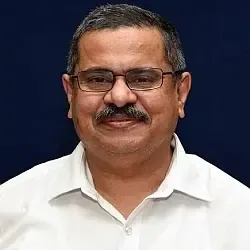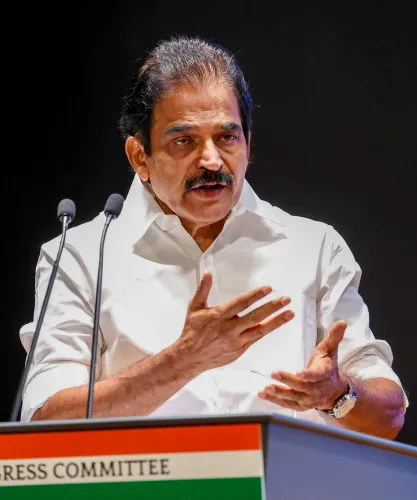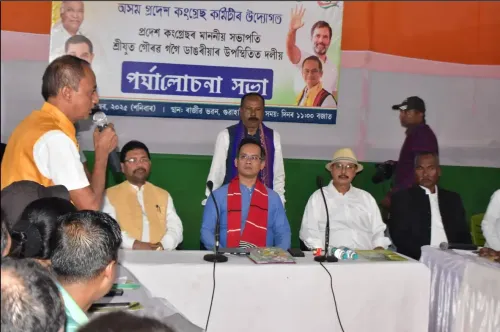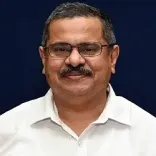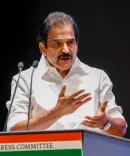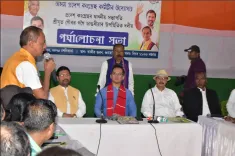Is Telangana Planning to Abolish the Two-Child Norm for Local Body Elections?

Synopsis
Key Takeaways
- Two-child norm abolished for local body elections in Telangana.
- Cabinet plans to expedite Hyderabad Metro Rail expansion.
- Commitment to procure all paddy produced during the season.
- New Agriculture Colleges to open in Huzurnagar, Kodangal, and Nizamabad.
- Local seat quota increased to 50% at NALSAR University.
Hyderabad, Oct 16 (NationPress) On Thursday, the government of Telangana announced the elimination of the two-child requirement for candidates wishing to contest local body elections within the state.
The resolution was made during a State Cabinet meeting led by Chief Minister A. Revanth Reddy.
Minister for Information and Public Relations, P. Srinivas Reddy, informed reporters that the Cabinet has approved the decision to abolish the regulation preventing individuals with more than two children from participating in elections.
He mentioned that numerous requests were made to revoke the two-child policy, with many arguing that such a rule is unnecessary given the stringent population control measures already in place within the state.
Currently, under existing laws, candidates with more than two children are disqualified from running for elections to Mandal Parishad Territorial Constituencies (MPTCs), Zilla Parishad Territorial Constituencies (ZPTCs), ward members, and sarpanches.
The State Cabinet also focused on speeding up the expansion of the Hyderabad Metro Rail. Discussions revolved around the takeover of the first phase of the Metro project from L&T, as this was hindering the progress of phases 2A and 2B.
A high-level committee will be established to thoroughly assess the feasibility and all related concerns of taking over the Metro Rail from L&T. The committee will be chaired by the Chief Secretary and will include various key officials.
The committee is tasked with reporting back to the Cabinet Sub-Committee on resource mobilization, which will then guide the Cabinet on the final decision regarding the Metro takeover.
Additionally, the Cabinet resolved to ensure the procurement of all paddy harvested during this monsoon season, with a record production of 1.48 crore tonnes noted. The Civil Supplies Department anticipates that approximately 80 lakh metric tonnes of paddy will be delivered to procurement centers across the state.
The Central government has committed to procuring 50 lakh tonnes, while the state has requested an additional 15-20 lakh tonnes.
Srinivas Reddy assured that, despite financial hurdles and other challenges, the government remains dedicated to procuring every grain harvested during the season.
The Cabinet also decided to promptly transfer a bonus of Rs. 500 per quintal for premium quality paddy, in addition to the Minimum Support Price (MSP), directly into farmers’ accounts.
Moreover, the State Cabinet has announced the establishment of three new Agriculture Colleges in the regions of Huzurnagar, Kodangal, and Nizamabad.
A Sub-Committee will also be formed to plan celebrations to commemorate the two-year milestone of the government, scheduled from December 1 to 9.
The Cabinet approved proposals to allocate an additional seven acres of land to NALSAR University of Law at its current campus in Hyderabad, increasing the local seat quota from 25% to 50%.
The Roads & Buildings Department's proposal to issue tenders for the construction of 5,566 km of roads at a cost of Rs. 10,547 crore under the Hybrid Annuity Model (HAM) was also approved.
This project involves building, upgrading, and maintaining roads connecting Gram Panchayats (GPs) to mandal headquarters, mandal headquarters to district headquarters, and district headquarters to the state headquarters.
The Cabinet has agreed to cover the Rs. 438 crore cost for acquiring 845 hectares of land for the construction of the Krishna-Vikarabad broad gauge railway line.
Furthermore, the Cabinet agreed to allocate 435.08 acres of land to the Defence Department as a substitute for defense lands set to be transferred to the state government for constructing elevated corridors in Greater Hyderabad.
Finally, the Cabinet resolved that the State Government will bear one-third of the total cost (Rs. 7,500 crore) for the construction of the Mannanoor-Srisailam elevated corridor over the designated urban forest. This 75-km-long elevated corridor will be developed in collaboration between the State and Central governments.


